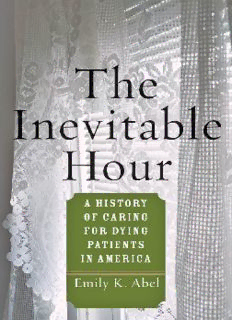
The Inevitable Hour: A History of Caring for Dying Patients in America PDF
Preview The Inevitable Hour: A History of Caring for Dying Patients in America
The Inevitable Hour This page intentionally left blank The Inevitable Hour A History of Caring for Dying Patients in America EMILY K. ABEL The Johns Hopkins University Press Baltimore © 2013 The Johns Hopkins University Press All rights reserved. Published 2013 Printed in the United States of America on acid- free paper 2 4 6 8 9 7 5 3 1 The Johns Hopkins University Press 2715 North Charles Street Baltimore, Mary land 21218- 4363 www .press .jhu .edu Library of Congress Cataloging- in- Publication Data Abel, Emily K. The inevitable hour : a history of caring for dying patients in America / Emily K. Abel. p. ; cm. Includes bibliographical references and index. ISBN 978- 1- 4214- 0919- 1 (hardcover : alk. paper) — ISBN 1- 4214- 0919- 4 (hardcover : alk. paper) — ISBN 978- 1- 4214- 0920- 7 (electronic) — ISBN 1- 4214- 0920- 8 (electronic) I. Title. [DNLM: 1. Terminal Care— history—United States. 2. Terminally Ill— history—United States. 3. History, 19th Century— United States. 4. History, 20th Century— United States. 5. Hospice Care— history—United States. WB 310] 616.02'9—dc23 2012035112 A cata log record for this book is available from the British Library. Special discounts are available for bulk purchases of this book. For more information, please contact Special Sales at 410- 516- 6936 or [email protected]. The Johns Hopkins University Press uses environmentally friendly book materials, including recycled text paper that is composed of at least 30 percent post- consumer waste, whenever possible. contents Ac know ledg ments vii Introduction 1 1 The Good Death at Home 8 2 Medical Professionals (Sometimes) Step In 22 3 Cultivating Detachment, Sidetracking Care 36 4 Institutionalizing the Incurable 57 5 “All Our Dread and Apprehension” 88 6 “Nothing More to Do” 103 7 A Place to Die 118 8 The Sacred and the Spiritual 136 Conclusion 166 Notes 175 Index 219 This page intentionally left blank ac know ledg ments Many people helped me write this book. My history writing group— Carla Bittel, Janet Farrell Brodie, Sharla Fett, Devra Weber, and Alice Wexler—r ead draft after draft, making generous yet sharp comments. Richard Abel, Lara Freidenfelds, Sandra Harding, Joanne Leslie, and Steven P. Wallace read individual chapters and provided extremely helpful recommendations. Jacqueline H. Wolf and Janet Golden helped me locate relevant archives. I also appreciate the comments of audiences at the Department of the History of Medicine at the Johns Hopkins School of Medicine, the Barbara Bates Center for the Study of the History of Nursing at the University of Pennsylvania School of Nursing, and the annual conference of the American Association for the His- tory of Medicine. I made a second trip to the Barbara Bates Center to confer with Julie Fairman and Joan Lynaugh, receiving invaluable suggestions. Numerous archivists guided me to relevant sources, especially Steven E. Novak, Columbia University Health Sciences Library, Archives and Special Collections; Russell A. Johnson, Louise M. Darling Biomedical Library, UCLA; and Arlene Shaner, Rare Books and Manuscripts, Library, New York Academy of Medicine. I received permissions from the State Archives Division, Kansas Historical So- ciety, to quote from the Martha Farnsworth Collection; the Center for Oral and Public History, California State University, Fullerton, to quote from oral history interviews; the Dominican Sisters of Hawthorne Archives, to quote from the Rose Hawthorne Lathrop Papers; the Manuscript Department, Library, New York His- torical Society to quote from the John Moff at Howe Diary and the Sigmund and Margaret Nestor Papers; Columbia University Augustus C. Long Health Sciences Library, Archives and Special Collections, to quote from the Presbyterian Hospi- tal Patient Rec ords, Elizabeth R. Pritchard, “History of Social Ser vice of Presbyte- rian Hospital,” and Columbia University, Offi ce of the V.P. for Health Sciences, Central Rec ords; the Sophia Smith Collection, Smith College, to quote from the viii Acknowledgments Dorothy Smith Dushkin Papers and the Thomas Thompson Trust Rec ords; the Mount Sinai School of Nursing Alumnae Newsletter to quote from the newsletter; Special Collections Research Library, University of Chicago Library, to quote from the John Gunther Papers; the Department of Special Collections and Univer- sity Archives, Stanford University, to quote from the Hawthorne Family Papers; the Schlesinger Library on the History of Women in America, Radcliff e Institute, Har- vard University, to quote from the Frances Fineman Gunther Papers; the Memorial Sloan- Kettering Cancer Center, New York, to quote from a Memorial Sloan- Kettering publication at the Rocke fel ler Archive Center, Sleepy Hollow; and Mari- anne P. Brown, Santa Monica, to quote from the Parker Family Letters. Portions of chapter 3 appeared in the Bulletin of the History of Medicine (2011): 29– 56. It was adapted and reprinted with permission by the Johns Hopkins Univer- sity Press. Jacqueline Wehmueller, Executive Editor of the Johns Hopkins University Press, encouraged this project from the beginning and provided both trenchant and supportive comments as it progressed. Carolyn I. Moser’s meticulous copyediting also improved the manuscript. My children and grandchildren have kept me connected to happier events than those chronicled here. My husband, Rick, has shared my delight in their lives as well as so much more. The Inevitable Hour
Description: